|
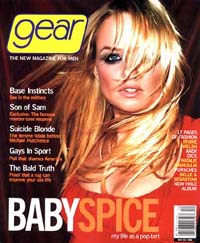
Can a girl be too cute for her own good?
More specifically, don't
the benefits of being Baby Spice shrivel to nothing next to the
drawbacks of being marooned inside a potentially humiliating straitjacket
of a persona? Neither of these questions were on my mind at the
beginning of December, 1996. The Spice Girls had just made their
maiden voyage to America to meet their soon-to-be enemies in the
media and shoot the video for 2 Become 1. 1 did one of their first
interviews here, which is to say I switched on the tape recorder while they shouted over each
other for a half hour. Where Geri came off like a
raucous motivational speaker, Mel B would have
barked like a seal to get attention,Victoria was a
little snippy and Mel C kept herself to herself, Emma
- who, in those days fibbed about her age, telling
some magazines she was 20 and others 18, and
puffed her way through a pack of cigarettes in public -
was reinforced sweetness. "I like you, I really
like you:' she said, aiming a full-beam, blinding
white smile at me after we'd sat at the same table
for 20 minutes. When no reply was forthcoming
- her charm stealth weapons could not penetrate
my low self-esteem shield - she huffed, 'You're
supposed to say you like me back', leaving me
thinking she was playing her little girl role like a
Method actress.
"Babies are everywhere," observes an awestruck eight
year-old. Her friend concurs: "I've seen one Victoria
and one Mel C, but everybody's Baby!" The
preponderance of blonde pigtails, white vinyl
platform boots and short dresses in baby blue and hot
pink provides startling proof that, in the new order
of the Spice Girls, Emma Bunton is clearly
homecoming queen. It's the middle of August, 1998, and
I'm in Denver's Fiddler's Green amphitheater. I
enter the Spice Girls' dressing room to find Emma
clutching a cuddly pink rodent and messily
gobbling her way through a plate of cherries. That
full-beam blinding smile switches on again. You might
think, in an age when female performers are proudly
proclaiming themselves bitches and brats, that no
one would want to bear the burden of Good Girl.
But Baby Spice is no role to be cast wearily
aside after the final encore. "I'm not trying to get
away from it at all:' she says of the child-woman
persona. "When I do magazines they say, 'We want
to take you away from that', but that's the way I
am. Sexiness, for me, is not so in your face. When
girls wear long, tight-fitted dresses, I find that sexy.
Or when they're cute." But there was that poignant
moment in the Spice World movie when she was
forced to reflect on being known as Baby Spice
when she turns 30. "I said that in jest. You can
either relate Baby to a little girl or you can relate it
to..." (she affects a husky growl) "hey, baby. Baby
doesn't just mean young and stupid." It does, however, mean a position as den mother to untold millions
of screaming pre-pubescents. "The girls always
take the piss out of me and say, 'Oh, if she wasn't
Baby Spice, she'd be working in a nursery. I love
the way children are, they're not corrupted by
anything, they're honest and they say, 'Hey, you look
sh#@! today'." The affection is mutual, evidenced by
the spot in the show where she hauls out a bashful
young lad from the side of the stage, clutches
his paw, sings to him and plants a smacker on his
cheek. "My security people go out and look for
fans and ask them if they'd like to come up. They're
always up for it, except sometimes they go stiff."
That neanderthal 'hur-hur-hur' you're no doubt
suppressing comes gurgling out of my throat. "I
didn't mean that:' she blushes. "I mean they just
don't move, which is very embarrassing." There's
no getting away from it, she's a Good Girl. "This
is the way I've always been. I'm just Emma."
Tony Blair knew what he had to do. It was December,
1996, and the affable, opportunistic leader of the
refurbished British Labour Party had a national
election coming up. The Conservative Party, in
power since 1979, was falling apart, rocked by infighting
and a series of ever-more entertaining sex
scandals. Then the Spice Girls came out in an
upmarket political magazine as Conservative
supporters. True, only Ginger and Posh actually
proclaimed themselves Conservative supporters, but
they also labeled Tony Blair as "hollow, shallow,
callow and slick". For Blair, who had courted the
youth vote to the extent that he encouraged the
impression that he sought out and enjoyed the
company of Oasis' Noel Gallagher, this was a slap
that needed to be speedily spun to his advantage.
Through the offices of the UK's weekly pop press
Blair let it be known that the Spice Girls song Say
You'll Be There was one of his Top Ten of the year
and that "...there has been free and frank debate in
the Blair household as to our favorite Spice Girl."
Plonk an alien down in the middle of any
British city at that time and it would have reported
back to the mothership that it was stranded in a
screechy, lurid queendom known as Spice World.
Endlessly discussed, dissected and debated on TV
and in the press, the depth of the groups impact on
their homeland could be gauged not only by commercial
clout, but also by their effect on the national
lexicon: female practitioners of over-exuberant
behavior in any walk of life were instantly labeled
'Spice Girls', while British politicians debating in
the Houses of Parliament even referenced the line,
'I'll tell you what I want, what I really, really want!'
"What is the state of the government if we can
have an influence?" asked Ginger. "That's terrible."
Especially since, in December, 1996, the Spice Girls
had been famous for a little under six months.
All previous attempts at establishing an all-girl band had
failed in the Britain of the 90s, but that didn't stop
Chris and Bob Herbert, a father and son
management team, from placing an advert in the British
entertainment trade paper, The Stage, for 18-23
year-olds who were, '...streetwise, outgoing, ambitious
and dedicated to an all-female pop outfit'.
The five who made it through auditions - Geri
Halliwell,Victoria Adams, Melanie Brown, Melanie
Chisholm and Michelle Stephenson - were told
they were going to be the components of a group
called Touch. Michelle Stephenson's mother was
diagnosed with breast cancer and she dropped out
of the group to be replaced by Emma Bunton, who
had been in a local theater musical with Victoria
Adams a couple of years before. The Herberts stuck
their charges in a three-bedroom house and put
them through voice and choreography lessons. But
once the five girls got an inkling of the caliber of
material the Herberts had in store they shucked off
the puppet strings and seized control of the means
of their own exploitation.
By the end of 1994, British record industry
functionaries, from the most soulless executive to
the cleaning staff, lived in fear of the prospect of a
spontaneous visit from the Spice Girls. "Let us
sing!" they'd shriek, "listen to our demos". Crash
enough parties, buttonhole enough producers, Djs,
managers and A&R people and you'll eventually
attract: A) a reputation as pariahs, or B) attention.
The Spice Girls won the latter and gained a manager
in Simon Fuller, best known up to that point for
handling Annie Lennox. Though Emma Bunton
now describes him as "a facilitator", it's likely he
played a significant part in inflating the Spice Girls'
personalities to cartoon proportions. In the summer
of 1995 they signed to Virgin Records in the UK.
After a period of recording they put tunes and
words on top of tracks constructed by two teams of
producers and their first single Wannabe, written,
Emma recalls, "in an hour" was released, first in
Japan, a nation known for its indiscriminate adoration
of pop records by cute, cartoonlike girls. The
single did a brisk 200,000 copies.
Before its UK release, no one was predicting
similar success. Then the British version of the cable
station The Box began airing the slapstick
Girls-Going-Nuts video for Wannabe. The single was
released at the end of July, 1996. Two weeks later,
it was No 1. Sock puppets, soccer teams, singing
firemen; anyone can top the charts in Britain with
a giminick; but it was immediately clear the Spice
Girls were a breed apart from your workaday pop
phenomena. In an environment packed with perfectly-groomed,
expertly choreographed boy
bands, all of them serenading their target
demographic with promises of eternal affection, the
Spice Girls, singing and dancing like a gaggle of
sozzled girlftiends falling all over each other at a
local disco while screeching along with their
favorite song, were a revelation.
The Girls spoke directly to the same audience
as the boy bands, but emphasized female friendship,
self-determination and the offloading of crap
boyfriends. They were all about, as they never
ceased blaring, 'Girl Power!' Though sketchily
defined, that banner is the reason the Spice Girls
have attracted more attention, debate, hostility and
business than any other female vocal group in the
history of pop. Recall all the exquisite records
contributed by the great girl groups through
Motown, the Latin Hip-Hop era and today's glossy
R&B packages, and none of them have come close
to achieving the stature of the Spice Girls. The
reason: they've got an ideology. It may be a bogus
one, it may disappear when you hold it up to the
light, but it's something to which they're inextricably
linked - and they've got identities. Towards
the end of 1996, the UK's Top of the Pops
magazine ran a feature assigning monikers to the Spice
Girls, Titian-haired Geri became Ginger, demon-
strative Mel B was Scary, tracksuit-clad Mel C was
Sporty, haughty Victoria was Posh and fluffy Emma
was Baby.
Britain, lacking an indigenous film industry, tends to
elevate pop stars to exalted status. VAiich is to say
that, in a country that prizes its pop stars, the Spice
Girls have long transcended flavor-of-the-second
status and become institutions. In America, however,
they have always been regarded with suspicion by a media
that sees them as, at best, fiercely
materialistic, live-action Beanie Babies. Critics
who worked themselves up into a lather over Fiona
Apple's honesty, jewel's sensitivity, Lil' Kim's raw
sass and Sarah McLachlan's clear skin suddenly
developed backbones and decided that the Spice
Girls were the one thing they were not going to
stand for, Conveniently ignoring the fact that as
much artifice and contrivance went into the
assembling of, say, the latest Hole record, US
commentators obsessed about the shrill Brit imports'
lack of talent and built-in obsolescence. 'They're
over!'was the verdict when the second album Spice
World sold only 80,000 in its opening week.
'They're over!' was the verdict when the group
sacked manager Simon Fuller (rumored to be as a
result of an affair with Baby, which she denies,
claiming she'd never go out with a man who had
dyed black hair and a sunbed tan).'They're over!'
was the verdict when, in July of this year, the most
voluble and articulate member, Geri Hathwell, quit
arnid insinuations of in-group acrimony. But
they're not over yet. Spice World went on to outsell
the current albums by Madonna, Mariah Carey
and Janet Jackson and the fitfully amusing, quickly
thrown together movie of the same name made
$77 million worldwide. The group simply became
their own managers: "It's like running a small
business," Emma tells me. Their US stadium tour was
a sell-out and their first single to be released without
Ginger in the ranks (the gorgeous Abba-esque
holiday romance ballad, Viva Forever) sold 280,000
in its first week of UK release. "People say, 'Oh
their 15 minutes are almost up, but we've had a
very very long 15 minutes," comments Emma.
(And then Posh and Scary got pregnant causing
those verdicts of 'They're oved' to start up again.)
Emma Bunton was born in Barnet, North London in
1976. "1 was a hyperactive child, I was always
posing." She started modeling, appearing on the
covers of catalogs and commercials for toothpaste (so
thats where the full-beam blinding smile comes
from), toys, travelcards and strawberries. Then she
saw Grease. "I wanted to be Sandy," she recalls. Her
mother, Pauline, bought her a pair of tap shoes and,
driven to distraction by her daughter's clattering
around the house, sent her to dance classes. She
enrolled at Sylvia Young's, an establishment whose
alumni pepper the casts of almost every UK
sitcom, soap opera and, of late, the pop charts.
When Emma was 11, her parents split up. Though she
remains close to her father, a milkman, Emma and
her mother became "like flat-mates". When she
went to concerts, mum would drive her, wait
outside, sometimes in the rain, then take her home.
This is why, when I ask if she was ever an evil child
like Sporty, who confessed to shoplifting sprees
she says: "I never went through a rebellious
phase. I had too much respect for my mother."
Emma remembers the first boy she ever kissed
("It was after school in Marylebone train station.
I didn't enjoy it much") but will not talk about
her current boyfriend, reportedly a member of
British boy band Damage. "When your other love
life's been splashed all over the papers you tend to
hold back a little bit more." The 'other love life'
involved a dental technician called Mark. She
broke up with him last year and he turned on her
like a jackal, selling their story to a British tabloid.
Clutching the stuffed pink rodent to her, she sighs:
"I haven't totally forgiven him, but if he needed
that money then let him have it. Obviously, I will
never see him again. It's an awful thing. That was
my private life and his, which is even more
embarrassing. We spent four years together, and I felt he
put the whole thing on display. When we broke
up I thought I'd always have a little part in my
heart for him, but that's g-a-w-n. "
Even though the last time the Spice Girls were
on The Tonight Show Emma told what could be
taken as a mildly anti-Geri joke ("What's the
difference between a curry and the Spice Girls? Only
one of them's got Ginger in it!"), she denies any
resentment. "A lot of people think it was a bad
thing. It wasn't. Geri had to go her separate way."
She remembers the recording session for their first
album: "Geri hired a male stripper to come and
dance for us in between songs. We made him
dance to a Cliff Richard video that was on the
telly and he got all pissed off." Her rueful
laughter suggests she still rnisses her departed colleague.
Without Geri, though, the band have closed ranks.
As I'm heading for the Denver dressing room, Mel
B confronts me and snarls: "Stop being so mean.
Be nice to her. Keep an open mind!" as if she's
caught me in the act of coating Emma's panties
with marzipan. "We're very protective of each
other," explains Emma. This is understandable -
although, you know, f#@k Mel B - when you're
constantly pursued by people eager to chart your
decline. I ask Emma if she's aware of their
dwindling presence on MTV and US radio. "People get
rid of their managers and go through changes all
the time but for some reason, when it's us, people
focus on it a lot. MTV said,'Hey we don't know
what's going on with you'. People lose faith, which
is upsetting. I'm proud of our music, but I can't
tell you why it's not on MTV.'
In the Denver arena, hundreds of little Baby Spices
crank up the 'Eeeeees' when the others bid Baby
bye-bye, giving her a solo stage on which to chirp,
twirl, mug and grin her way through "ere Did
Our Love Go? She's fuller figured than her
hardbodied bandmates, her voice is soft but serviceable
and her dancing skills are rudimentary, but the
lights that go on in the tots' eyes when she's beaing
at them is proof positive that her gift of audience empathy
is considerable. Posh is an ice sculpture come
(barely) to life, Scary's always on, Sporty's
your bud, but Baby's not only the one they all want
to be, she's the one they believe they could be.
Backstage, I ask what dreams she can have left
to fulfill, and she talks of working with Janet
Jackson but "...personally, I'm just really looking
forward to having a family". I ask if she's become
impervious to the constant criticism. "You're only
human and you have feelings:' she says. "I've grown
a bit stronger over the years. If you let the good
press affect you, then you become some big-head-ed
pop star wanker. If you let the bad press affect
you, then you become a complete nightmare and
lose your head." As if something's occurred to her
that she just has to impart, she leans forward and,
eyes suddenly shining, says: "Another thing I'd like
to say is, I don't think you can come into this
industry with an emptiness you think it's going to
fill. You have to be fulfilled and know who you
are in the first place. You have fans, you have
people screaming, but that's not everything. You get
money, but that's not everything. I've been
modeling and acting for a very long time and I've really
enjoyed it but I've never felt like I've needed it.
When I go home I don't live in a huge mansion,
I live in a three-bedroom house with my mum and
my brother. I live a normal life just like everyone
else." Then she laughs. "Well, I can't say just like
everyone else..."
Cute, but not too cute for her own good.
Return to Interviews
|
girl power |
Pics from interview
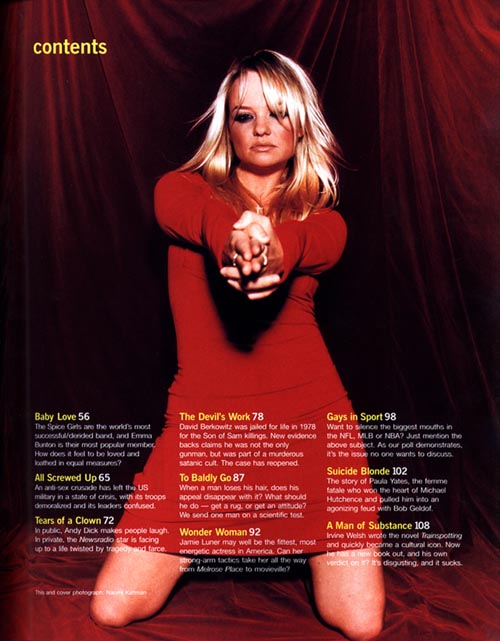
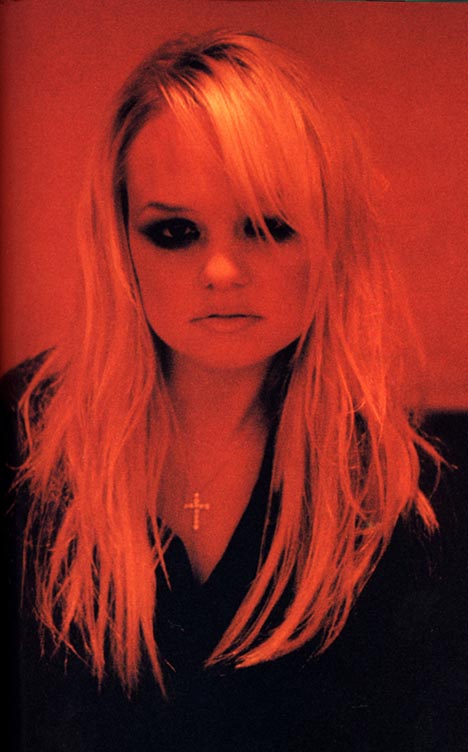
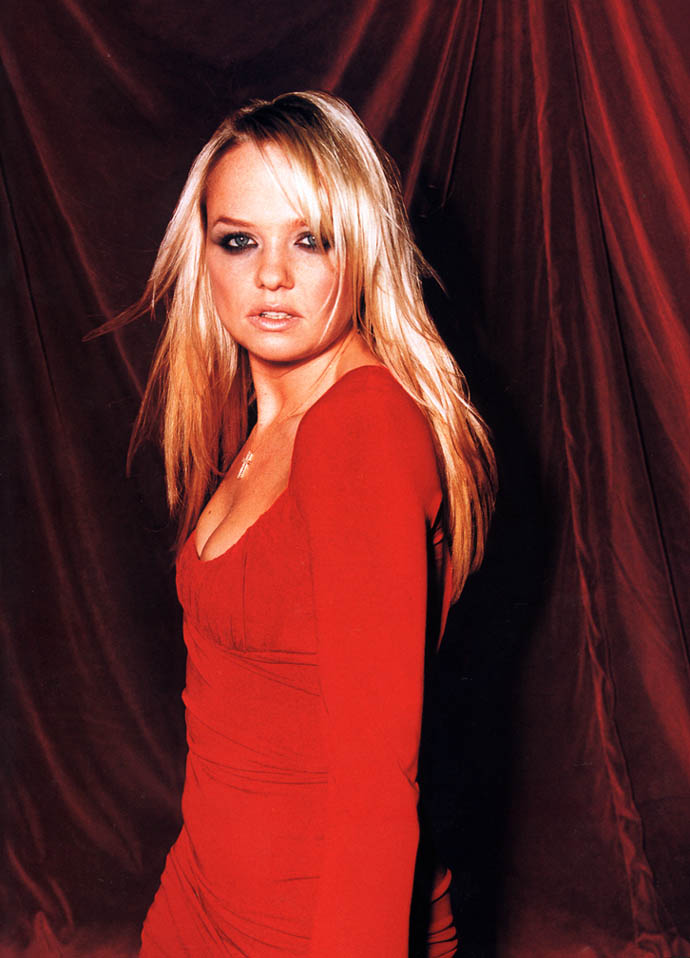
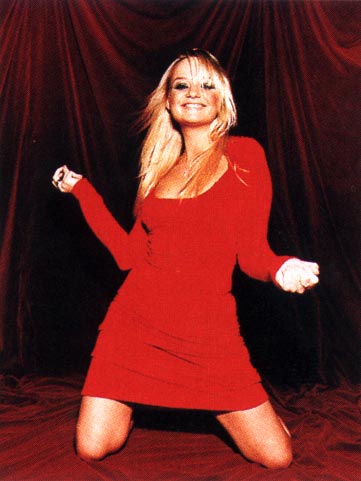
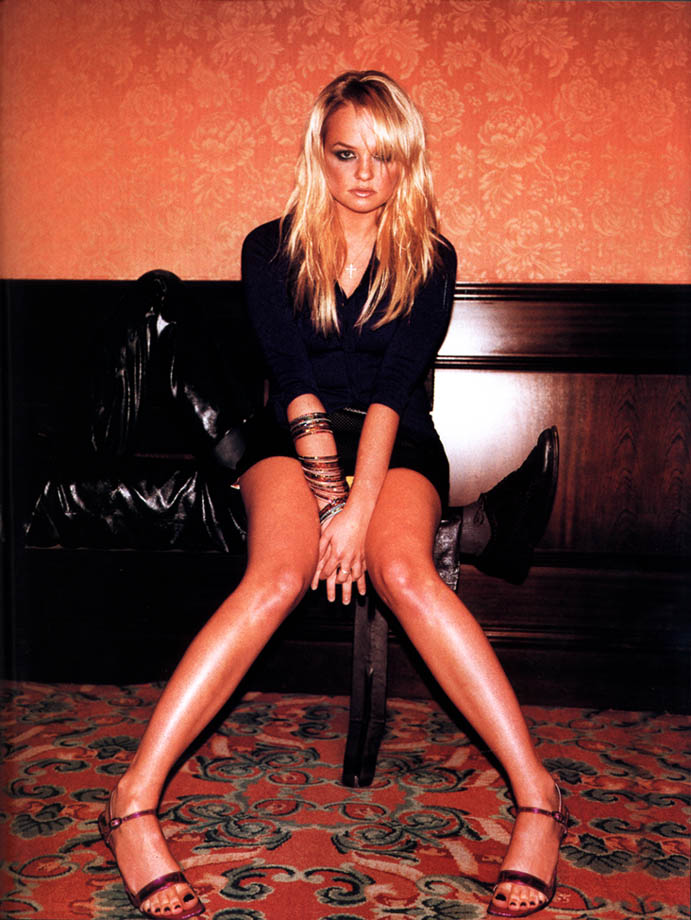
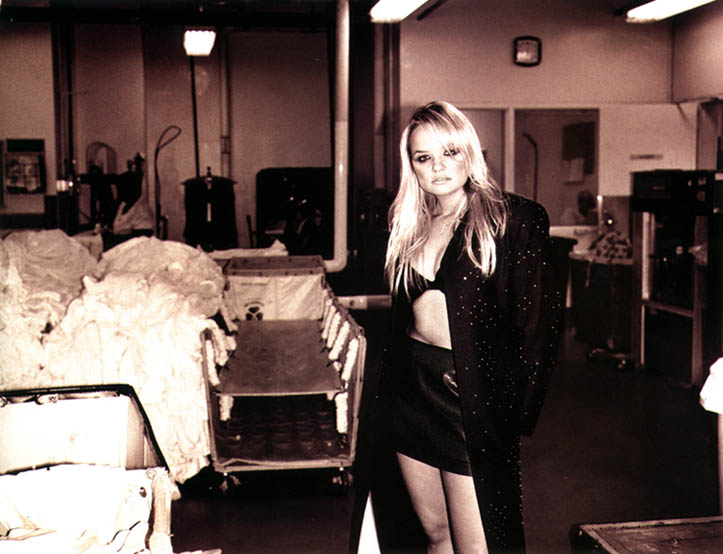
|

